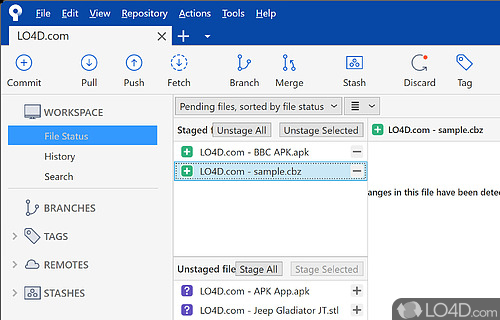
#Sourcetree rebase in progress pro#
7.3 Git Tools - Stashing and Cleaning in Pro Git.The stashing coverage in the “Filesystem interactions” chapter of Git in Practice ( book website or read on GitHub) The Rebase Option As an alternative to merging, you can rebase the feature branch onto main branch using the following commands: git checkout feature git rebase main This moves the entire feature branch to begin on the tip of the main branch, effectively incorporating all of the new commits in main.Then you reapply and delete the stash and pick up where you left off.įor more details about stashing, I recommend In our case, “do something else” is to get the upstream changes with a nice, simple git pull. Now you can do something else, without a lot of fuss. Version 2.1.2.4 does seem to resolve my issue, I just tried the same interactive rebase again and it properly squashed all four commits into one. Git stash is a way to temporarily store some changes to get them out of the way. I had to edit the config file and change the window width and height and initial state, then it started without crashing. But if you want to use git stash, this opportunity is as good as it gets. Also with tags we can track important milestones. With source control we can check the history of a file, who and when modified a file, what was a reason for a change and which files changed together. I am not a big fan of git stash I think it’s usually better to take every possible chance to solidify your skills around core concepts and operations, e.g., make a commit, possibly in a branch. Git rebase with SourceTree by fragi in Tools There are many benefits of having a source control. (I personally would choose to commit and execute a workflow described in 29.2.) Now what? First, you must safeguard your local changes by either stashing or committing them. From :jennybc/ethel db046b4.2d33a6f main - > origin/main Updating db046b4.2d33a6f error: Your local changes to the following files would be overwritten by merge: foo.R Please commit your changes or stash them before you merge. To fix the conflict, you can follow the standard procedures for resolving merge conflicts from the command line. It is very rare that you would choose this option. That means that none of the changes introduced by the problematic commit will be included. remote: Total 3 ( delta 1 ), reused 1 ( delta 0 ), pack-reused 0 Unpacking objects: 100% ( 3/3 ), done. You can run git rebase -skip to completely skip the commit.

remote: Compressing objects: 100% ( 2/2 ), done.

remote: Counting objects: 100% ( 5/5 ), done.


 0 kommentar(er)
0 kommentar(er)
